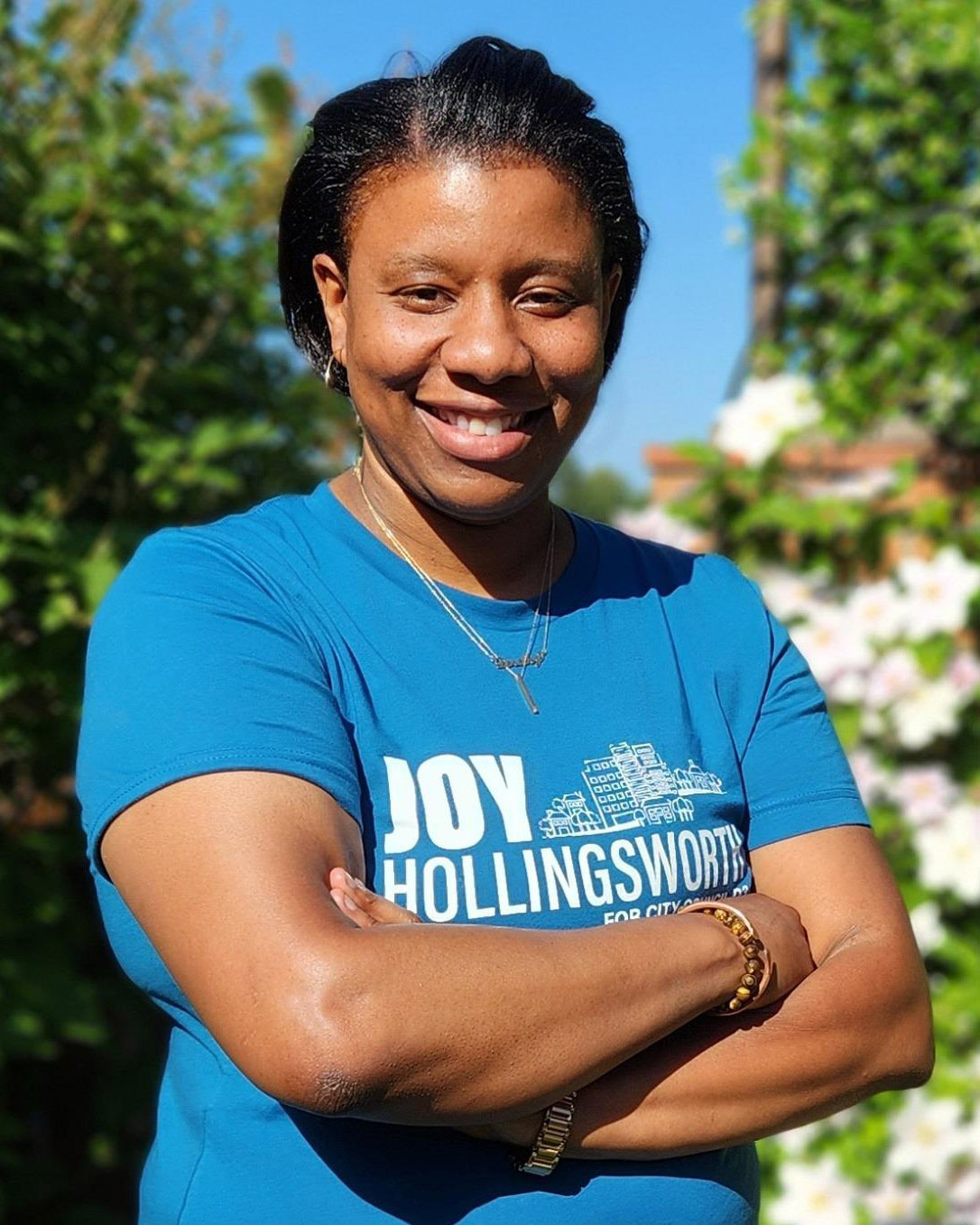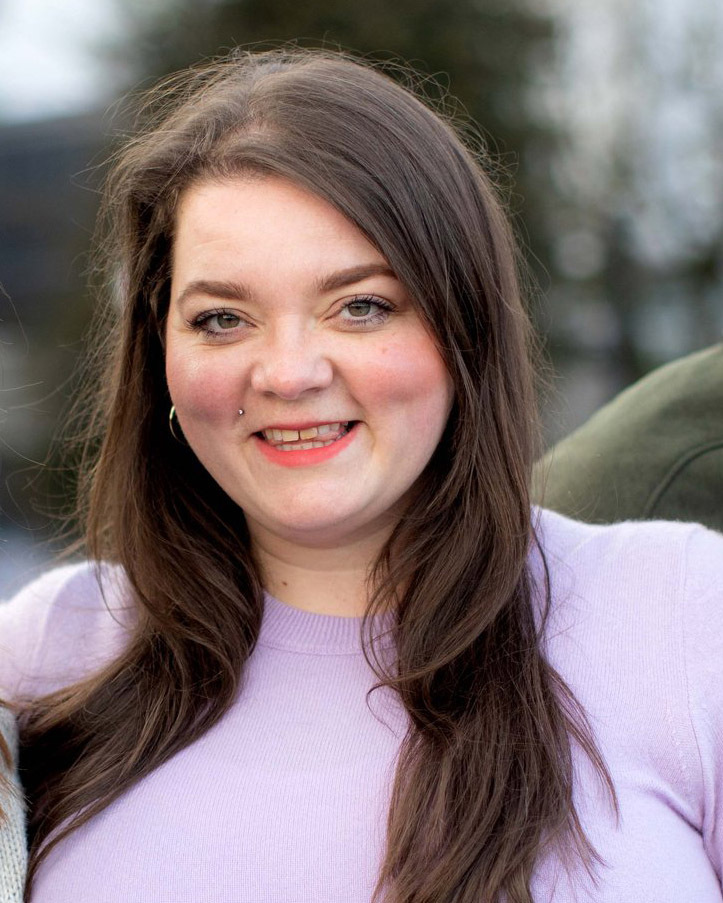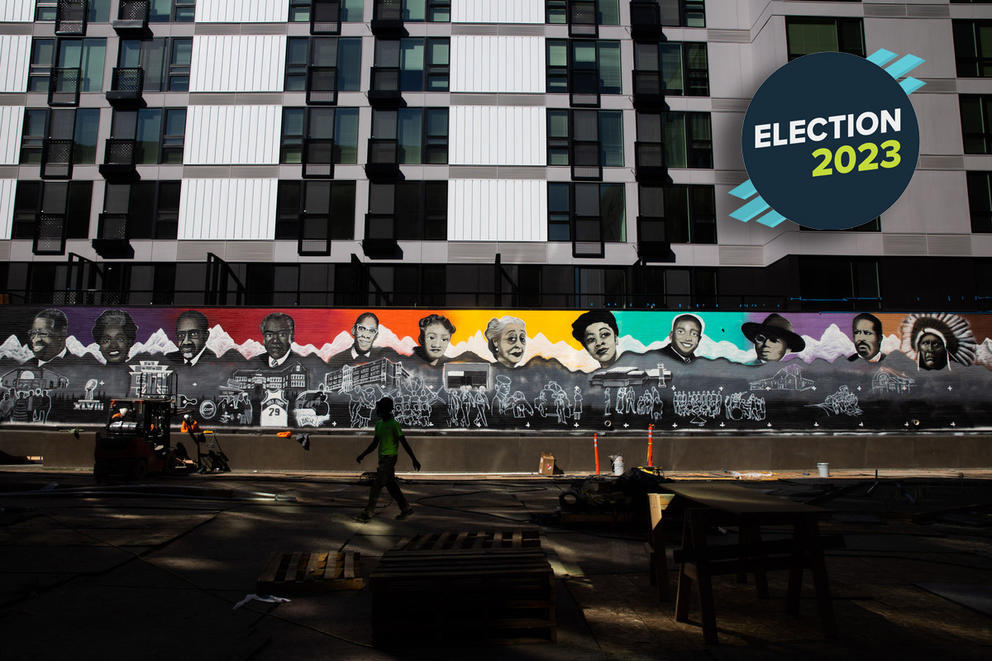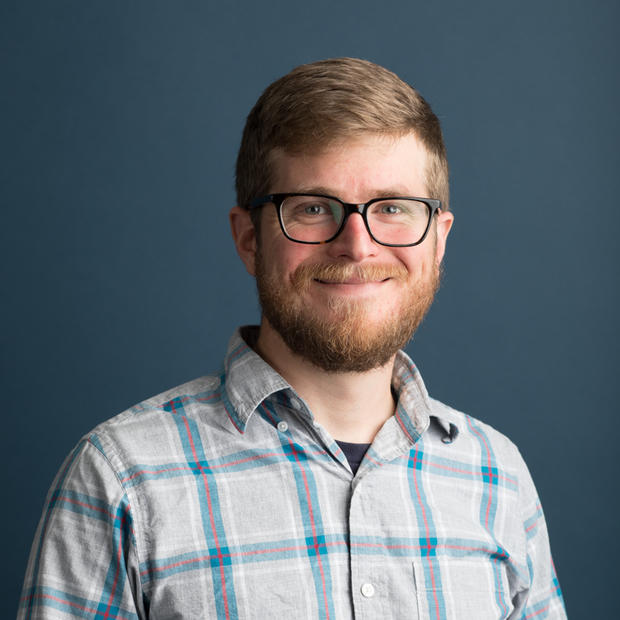Hollingsworth works for the nonprofit Northwest Harvest supporting food banks and meal programs with a focus on organizations serving communities of color. Prior to that she helped run her family’s cannabis farm and served as its policy analyst. Hollingsworth has lived nearly all her life in the Central District and has seen how top-down policy from City Hall can have unintended impacts on a community.
Hollingsworth said she was inspired to seek election by two pandemic experiences. The first was her mother calling Hollingsworth to take her grocery shopping because she didn’t feel safe going alone. For Hollingsworth, it marked a real decline in Seattle’s public safety if her mother, a “badass” who grew up in a New Orleans public housing project, no longer felt comfortable at the store.
Then there was seeing nurses at the front lines of pandemic response coming to food banks because they couldn’t afford groceries amid Seattle’s rising cost of living.
“The reason why I’m running is my experience with public safety, working with families that cannot afford to live here on the front lines of food insecurity, being a small business owner working on a farm that understands sustainability and climate change, reinvesting in our youth that we have really missed out on … and the intersectionality of literally everything I just listed,” said Hollingsworth.
Hudson was the executive director of nonprofit Transportation Choices Coalition for nearly five years until she stepped down to focus on her race for City Council. Prior to that she was executive director of the First Hill Improvement Association. Hudson says her experience in public service sets her up to hit the ground running if elected to City Council.
Hudson also cites experiences during the pandemic as impetus for entering the race. The first was becoming the legal guardian of a teenaged family member. She said it gave her a fresh perspective on what needed to change in Seattle to make it safe for her daughter to navigate the city by herself or to be able to afford to stay long-term.
Seeing somebody collapse on the sidewalk in front of her, bleeding from the mouth, deeply shook Hudson. After 15 years of living on First Hill, she’d witnessed a lot of stuff, but this made her actually consider moving away from Seattle.
“I either bounce, and let it be somebody else’s problem, or step up, and I push even harder. And I’m just not the kind of person who walks away when I see that there’s something that needs to get done,” said Hudson. “The most influential policy decisions that shape our lives happen at the level of the city … And we deserve to have representatives on our City Council who are thinking about how to make our lives better.”
Crosscut sat down with both D3 candidates to talk about the big issues facing the city, compare and contrast their ideas for improving things, how to tackle the budget and plenty more.
The Issues
Public safety
Hollingsworth said she takes a holistic view of public safety that includes first responders, police alternatives, addressing homelessness, and even improving city infrastructure like street lighting.
For her, it starts with police staffing levels. She wants to see the Seattle Police Department continue recruitment to increase its number of deployable officers, which would reduce 911 call-response times and give the department more capacity for criminal investigations and other duties like accompanying firefighters into encampments.

Hollingsworth supports Mayor Bruce Harrell’s recruitment plan, which includes hiring bonuses, but also thinks that the City Council’s critical tone around policing has to change before SPD will be able to make real progress on hiring. Hollingsworth said she also wants to see more accountability and transparency within the department.
Hollingsworth also wants to see more resources dedicated to alternative public safety responses. She supports the co-responder model the city is piloting, in which mental health professionals and social workers will respond to certain lower-level emergencies alongside sworn officers. To address the shortage of social workers available for emergency responses, Hollingsworth said, “Social workers should get paid just as much as police officers to do a co-responder model.”
As Seattle launches its police co-responder model, Hollingsworth wants the city to also ramp up Health One, the existing firefighter co-responder model. Health One sends case managers alongside firefighters for certain physical and mental health emergencies.
Hollingsworth also wants to see more resources dedicated to community-based violence prevention and intervention organizations like Community Passageways and Choose180. More generally, she wants to see more investment in youth programs, late-night activities at community centers and other ways to give kids things to do.
Hudson called public safety the most fundamental duty for the city. But she wants to focus on police alternatives and root problems rather than police staffing levels.

To tackle the rise in gun violence, Hudson wants to see more investment in community violence prevention and interruption that does de-escalation work in violence hot spots and provides services and support for victims and their families. Hudson said because gun violence is a regional problem, she wants to see the response elevated to a regional level that’s scaled up to meet the need.
Hudson wants a significant expansion of Health One, calling it the health-based alternative response that many people have been asking for in broader conversations about policing. “Why don’t we have Health Two, Three, Four? Why aren’t we at Health 15 by now, right? We’re funding that program at more or less the same level as we did when that got started.”
In a similar vein, Hudson wants to see more support for Let Everyone Advance with Dignity (LEAD), a program that connects low-level offenders with case managers and services rather than going through the criminal legal system.
Homelessness
“Homelessness is a housing problem,” said Hudson when asked how to address one of Seattle’s most pernicious crises. As such, she thinks it’s imperative that Seattle lower the cost of housing for residents by building more subsidized affordable housing, as well as unsubsidized market-rate housing so people can find places to live.
In the short term, Hudson said the city needs to build significantly more shelter space to get people off the street. She supports building more tiny home villages.
Hudson said her experiences as a board member for affordable-housing nonprofit Bellwether Housing and helping to find space for housing and shelter on First Hill will be invaluable for that task. She recognizes that there’s almost always pushback to proposals to build new shelter and housing, but said it’s a surmountable problem when “working with community and being like ‘We all want to solve this problem together … what are your concerns? How do we mitigate them? How do we move forward?’”
Hollingsworth similarly wants to see the city build a lot more homeless shelter space. She particularly wants to see more tiny home villages, saying it’s a tool that’s worked well. But she also supports motel conversions and RV safe lots, and wants to see the city expand its supply of permanent supportive housing that helps people exit homelessness long-term.
She also wants to expand the number of day centers to give unhoused people somewhere to go. “People talk about human feces on the street, but where are they supposed to go if a coffee shop says no, you know what I mean? Let’s give them a place to go like a day center to get connected to resources.”
Hollingsworth said that while she recognizes some of the King County Regional Homelessness Authority’s early struggles, she wants to continue supporting the agency while figuring out how to improve it.
Housing affordability
Hollingsworth is a big supporter of “missing middle” housing such as duplexes, triplexes and backyard cottages. She and her siblings converted her grandmother’s home into a triplex that’s now multigenerational housing for the family. Hollingsworth rents her unit in the triplex from her father.
The cost and experience of doing the triplex conversation convinced Hollingsworth that Seattle is missing the mark on permitting. She wants it to be faster and cheaper for people to build missing-middle housing. “It shouldn’t cost a family $70,000 [in fees] to build an ADU in their backyard.”
Hollingsworth does not believe in a one-size-fits-all approach to density, arguing that what’s appropriate housing on Capitol Hill isn’t for the Central District or Madison Valley.
Housing is one of the central issues in Hudson’s campaign, and she has a five-page list of housing policy ideas on her campaign website. She said she brings a valuable perspective to housing issues as one of the few renters seeking election.
Compared to Hollingsworth, Hudson is much more of a density booster. She said, “We need to radically upzone the amount of land that we allow people to build housing on.”
Along with that, she wants to make it faster and easier to get the permits necessary to build housing, whether it is subsidized affordable housing or market-rate development. She said that as a Bellwether Housing board member, she’s seen projects take two years to line up permits for affordable-housing projects funded by government grants.
Hudson also supports the city’s newly formed, voter-approved social housing developer, which seeks to build mixed-income, subsidized affordable housing.
The drug crisis
Hudson does not support arresting or jailing people with substance-use disorders, which she sees as a public health issue. “Jail doesn't solve drug addiction any more than it cures cancer. … I’m not interested in fantasy. I’m interested in evidence-based solutions that actually turn our city around.”
She wants to see a significant expansion of on-demand, medication-assisted treatment so people can get the help they need when they’re ready to get it, rather than waiting days if not weeks for help, as is often the case today.
Hollingsworth said her perspective on how to address Seattle’s drug crisis evolved as she watched her wife’s brother Manny’s experience with substance-use disorder. He had long dealt with drug addiction, but fentanyl accelerated his struggles and led to homelessness. He eventually wound up in a motel that had been converted into a homeless shelter, where he was murdered by another resident.
Hollingsworth said if the city was serious about treating the crisis, medication-assisted treatment options like methadone and suboxone would be available on-demand for anyone who needs it. But Manny’s death also makes her wonder if jail could have saved his life. As such, she supports aligning city code with state law to allow the City Attorney’s Office to prosecute drug possession as a gross misdemeanor.
Paying for everything
Driven in part by the slowing real estate market, layoffs in the tech sector and inflation, Seattle is projected to face a $251 million general-fund deficit in 2025 that will grow to nearly $500 million in 2026. The incoming City Council will have to navigate that shortfall as they seek to fulfill their campaign promises.
Progressives want the city to levy new taxes to tap into Seattle residents’ vast wealth. Business leaders and the Seattle Metropolitan Chamber of Commerce want city officials to tighten the belt and take a close look at existing spending to find savings.
Hollingsworth said she agrees with the Chamber that step one is to take a close look at the budget to see if there are places city programs are missing the mark. After that, she said she’s open to considering some of the new revenue ideas proposed by the Revenue Stabilization Workgroup. She also thinks that if the city focused energy on Downtown revitalization, it could help bring back tax revenue to the city that was lost because of business closures during the pandemic.
“I think we need to look at it from multiple angles, not just oh, we need a new tax,” said Hollingsworth. “People are getting taxed to death in our city.”
Hudson is also open to a budget audit as a starting place. But she also said that if we need to scale up resources and investments, Seattle will probably need new revenue. Of the ideas proposed by the Revenue Workgroup, Hudson is most compelled by the idea of a city-level capital gains tax.
Fundraising and endorsements
As of this writing, the Hollingsworth campaign has received over $186,000 in donations. Hudson has received over $134,000.
Hollingsworth has been endorsed by Mayor Harrell, State Rep. Sharon Tomiko Santos, former King County Councilmember Larry Gossett and many other current and former elected officials. She also earned endorsements from labor and community organizations including the MLK Labor Council, Seattle Building Trades, UFCW 3000, the Seattle Firefighters Union, the Alliance for Gun Responsibility, Puget Sound Sage’s sister organization Sage Leaders and the Washington Hospitality Association.
Hudson has been endorsed by King County Councilmembers Claudia Balducci, Rod Dembowski and Joe McDermott; State Rep. Liz Berry; and State Sen. Marko Liias, among other officials. Her labor and community organization endorsements include Amalgamated Transit Union Local 587, Teamsters Local 28, Protec17, SEIU 1199, Planned Parenthood, Working Families Party, National Women’s Political Caucus of Washington, and more.
Update: This article was updated to clarify that Hollingsworth rents the home she lives in.



